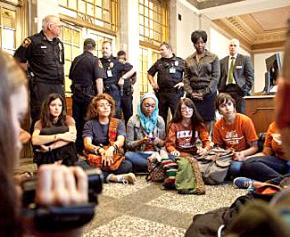Do the right thing, Longhorns
and are among 18 student protesters facing a virtual gag order after they were arrested for demanding that the University of Texas join an anti-sweatshop consortium--a reform the university president has just agreed to.
THE UNIVERSITY of Texas (UT) at Austin, the largest collegiate apparel provider in the world, has agreed to sign with the Workers Rights Consortium (WRC), a labor-rights monitoring group that works to end sweatshop conditions in the making of university apparel.
The decision was the result of a nine-year campaign by student activists. Throughout negotiations with the university, administrators repeatedly insisted the matter "was closed." Most recently, the logjam was broken by a sit-in at the office of UT President William Powers, during which 18 students were arrested.
Three months later, while the majority of students are away for summer vacation, President Powers announced his decision to sign on the WRC. But this important milestone came just a few days after the 18 students arrested during the sit-in were offered a rotten plea agreement by county attorney.
As the fall semester approaches, students must determine the forecast for possible organizing in the following semester and decide if they should take the plea deals. The deal would essentially silence these students for up to six months, effectively allowing the university administration to authorize where and when the most active students on campus fight back.

On the other hand, students can choose to organize a defense campaign and shine a spotlight on the hypocrisy of President Powers and the administration for continuing to press charges on students who ultimately convinced him of the need to sign onto a dependable labor-monitoring group.
WRC affiliation puts the university one step closer to making sweat-free apparel, but two more key reforms are needed before students can say Longhorn clothing is anywhere near socially responsible. The next step is joining the Designated Suppliers Program, which ensures factories that produce university apparel practice fair labor standards, including paying a living wage, providing safe working conditions and guaranteeing workers the right to organize.
The final step is to break from the notoriously discredited Fair Labor Association (FLA), a fig leaf masquerading as a watchdog institution that has done next to nothing to eliminate sweatshop labor conditions but has done much to revive the ailing image of massive corporations like Nike and Disney.
While the plea deals appear to be a generous offer from the university, it is really a warning to students on campus that if you try change the university, you will be punished--unless your dissent is confined to designated "free-speech" zones between the hours of 8 a.m. and 5 p.m. In that case, you will be silenced.
IN A recent interview with the Austin American-Statesman, President Powers said: "We had very productive discussions, a couple of meetings. They made very good presentations about the added value of WRC."
But this is a display of the most self-serving selective amnesia. The reality is that it took 18 students getting arrested for Powers to seriously come to the table. His comments disregard the years of work put in by dedicated students and the bonds of solidarity built amongst various organizations on campus.
The last sit-in was only the latest in a long history of student and faculty struggles. In 1999, the Center for Asian American Studies was created after years of organizing and 10 students occupying the UT Tower. Forty students sat in the Tower in 1998 to pressure then-President Faulkner to make a statement and give public meetings on the future of affirmative action.
In 2005, students camped out for three days to protest cuts to grants, scholarships and increasing tuition. We are foolish to think WRC affiliation will be the last struggle in which students will have to resort to civil disobedience, especially if we want to continue the fight to join the Designated Suppliers Program--and finally break from the FLA.
To not organize a defense for the arrested students is a disservice to the next generation of activists on campus. If students before us had not fought for our right to protest, we would not have done it, and the WRC would have never set foot at UT.
We, the authors of this article, were two of the 18 arrested at the sit-in, and it seems to us that at the moment that we've won a significant victory, we should find a way to go on the offensive instead of accept the university's restriction on our ability to continue organizing.
And if we accept these terms, we fear that it will be harder to build a successful future struggles if we constantly face the threat of arrest from an administration that thinks it can use this tactic to silence us for lengthy periods of time.
Graduate student Michael Gould-Wartofsky coined the term "Repress U" to describe tactics used by university administrators to silence protest--and these include throwing the book at student protesters and waiting until the summer to defuse organizing. Let's take this opportunity to show the class of 2016 that when the guardians of "Repress U" try to silence our struggles, we respond with masses of organized students.
It's time for this pattern of responding to protest with police to stop in favor of a policy of active engagement with student concerns. We demand that the charges against the students arrested be dropped. We demand that the University revise its policies in dealing with student protesters. But most importantly, we demand that the university drop its commitment to the Fair Labor Association.


